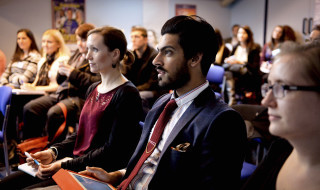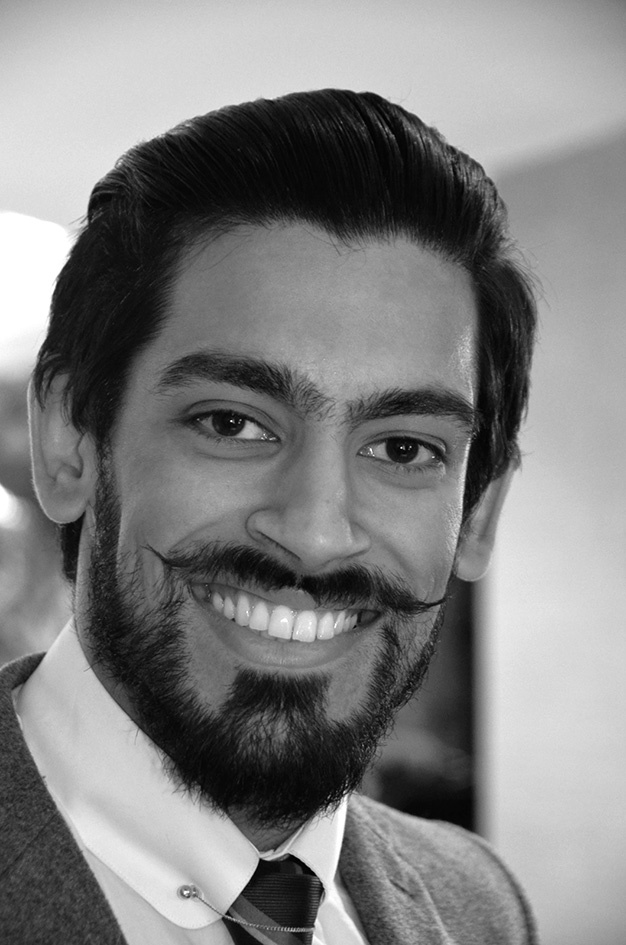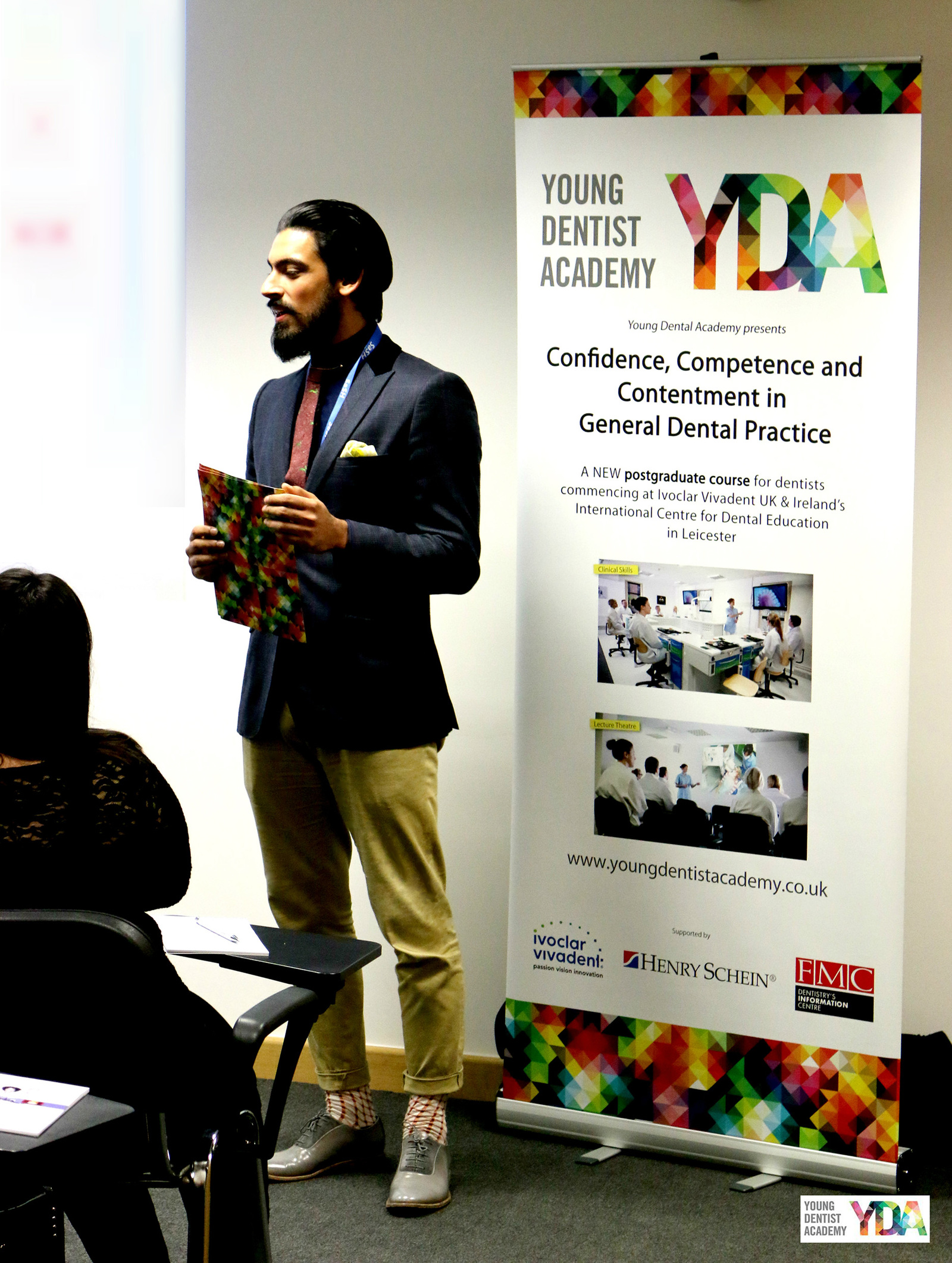 Not your conventional dentist, Dr Shiraz Khan has a persona of uniqueness and individuality. Versha Miyanger speaks to one of the profession’s most colourful characters about his background as a dancer, his never-ending quest for learning and his passion and commitment to the art of dentistry
Not your conventional dentist, Dr Shiraz Khan has a persona of uniqueness and individuality. Versha Miyanger speaks to one of the profession’s most colourful characters about his background as a dancer, his never-ending quest for learning and his passion and commitment to the art of dentistry
Can you tell us a bit about your background?
I am from a mixed-Arabic/Asian heritage, however, I was born and bred in the area of West London. Having moved to Birmingham, I completed both my BSc and BDS as part of the classes of 2007 and 2013 respectively. However, my zealous interest in dentistry is not all that makes me tick. Having been a competitive dancer for nine years allows me to exercise my creativity and in all honesty, allows for my passion and commitment to dentistry to remain unparalleled. As a competitive sports player in my more junior days, I was selected to play county cricket, and local club-level football and basketball. However, moving into dance, the breaking category, became the more provident hobby and I haven’t stopped since.
What or who made you choose a career in dentistry and focus specifically on restorative dentistry?
Dentistry was not always a career that was on the cards. Actually, I had initially undertaken a medical science degree to explore the possibilities. Having successfully completed this degree, I decided to carry out work-experience in various aspects of healthcare, including optometry, medicine, pharmacy, and medical research. Of all of these, dentistry combined the involvement of developing interpersonal relationships, with exercising manual finesse and therefore my career choice became a no-brainer. Having worked in a surgery as a dental nurse/receptionist allowed me to quickly understand many aspects to dentistry, including the business/entrepreneurial side.
Restorative dentistry is really all encompassing and having undertaken several restorative posts, including honorary roles, has allowed me to combine my understanding of more routine cases with the difficulties of more challenging cases. Although it is early in my career, I hope to continue to develop along this career pathway in the future.
Can you tell us about the training you have completed and are undertaking at the moment?
I have recently undertaken my membership exams to the become part of the Royal College (MJDF), and have finished other postgraduate qualifications involving primary care, medical education, oral surgery and research methodology. As part of my portfolio of development, I am currently in the process of enrolling onto a full-time Masters course to start this year.
Can you describe your typical working week?
Well, where do I begin. There is no typical week currently. There is a standard four-day week working in practice, across Battersea and Surbiton. In addition, I am working as both a locum restorative trainee and oral surgeon at Croydon University Hospital. This combined with a day a week at least, spent either lecturing or learning amongst my professional peers allows for a highly varied week whilst still having clinical dentistry as my backbone.
You have achieved a lot at a young age and are a member of many boards and have lectured extensively – what do you think is the secret to your success and what keeps you motivated?
In all honesty, I am very grateful for the opportunities that have been presented to me, albeit at this early stage. Of course, I must thank all of those who have provided me with the opportunity to share my knowledge and experiences, whether that is with undergraduates or postgraduates. It is clear that working, almost continuously around the clock, will always lead to opportunities. There are many opportunities that I have taken, which on the outset, appear to be irrelevant to my career aims or objectives, or, provide no monetary recompense. In fact, quite often, certain opportunities in the early stages have incurred a cost for me. However, I do believe that a certain level of dedication is required to be shown for your peers and seniors to recognise what you are trying to achieve. Motivation is pivotal to this process. If you have clear or even clouded objectives, the fact remains that a direction exists. And for the most part of my career so far, doors have opened and even if there is a vague chance of progression towards my greater goal, it is important to ensure that the opportunity is taken. This is the simple fact that keeps me pushing and striving to achieve.
 Why do you enjoying teaching and sharing knowledge?
Why do you enjoying teaching and sharing knowledge?
Having attended many courses in the past has developed a curiosity in how to deliver effective educational episodes. Therefore, I undertook a diploma as part of Health Education Kent, Surrey & Sussex Dental Core Training (DCT), which included medical education. This has provided me with a framework that I use for delivering didactic teaching, small group seminars or even one-to-one teaching. Several of my role models who teach regularly, have inspired me to teach, ensuring you bring your own personality when doing so. It is something special to see others inspired by and educational intervention, and I just hope I will be able to do the same at some stage in my career.
You are a big user of social media in the dental circuit – how has this helped you?
This in itself is a very interesting area, which has received a lot of press over the past two to three years. Social media definitely has helped achieve awareness amongst my peers and colleagues. In all honesty, there is very much that can be achieved through the utilisation of social media, ensuring that you are setting a positive image, and not delving too deeply into your personal life and affairs. This being said, it is clear that there are potential pitfalls in using social media.
A recent article by Neville and Waylen (2015) provided insight into e-professionalism, which highlights the responsibility of professionals to ensure that utilising such web disseminations does not in any way breach any of the General Dental Council’s Standards for Dental Professionals. Nonetheless, mature and responsible use of social media will indeed provide an opportunity for one and even businesses to reach a variety of audiences in comparison to traditional channels.
What is your favourite type of dentistry?
Counter-intuitively, I thoroughly enjoy oral surgery and conservative dentistry. Although one is associated with removing teeth and the other with saving teeth, both have the patient’s best interest at heart. Providing the patient with an opportunity to smile again has provided me with some of my most gracious patients whilst removing teeth, which are the root of a patients suffering, provide equal grace.
What is the most satisfying aspect of your work?
There are two answers to this question for me. I feel that if one is able to achieve a sense of understanding for a principle or technique being taught provides me with utmost satisfaction. It is fantastic to provide your opinion on a matter and it to be well received. The second is exceeding the expectation of your patients. It is important that patients are always integrated into treatment planning, ensuring that all benefits and risks are discussed, with an indication of likelihood of the success of that treatment. Being able to work with the patient to optimise an outcome always leaves patients happy, with a smile on their face and honestly, this provides me with the most personal gratification.
Professionally, what are you most proud of?
After only two years in dentistry I have been voted as a finalist for the Best Young Dentist of the Year 2015. This itself is a tremendous accolade to have been nominated for, and irrespective of the result I am extremely gracious to all those that have made this possible. As part of my portfolio that was submitted, I was invited to the House of Commons for the launch of the Improving Oral Health in Older Persons Project (IOHOPI) back in March 2015. This was a fabulous occasion for myself, and the team that have been rolling this project out in to the South East of England. Moving onwards, I look forward to the opportunity in extending my clinical practice into the heart of London.
We understand congratulations are in order as you recently got married – how do you balance your work and family life?
Thank you ever so much. It has been the most monumental occasion in my life so far. The lovely lady has consistently supported my development, and me even if it is at the cost of ‘our time’. It is this level of commitment that has allowed us to take the next step. That being said, ensuring that ample opportunity to enjoy the simple amenities in life, such as afternoon tea and occasional trips to the theatre allow for downtime from work. There is no doubt, she has been an absolute dream thus far, and I hope that I am only to provide her with a life full of happiness in the future, with God’s grace.
How do you relax in your spare time?
As I previously alluded to I thoroughly enjoy competing internationally in breaking competitions. This not only allows for the opportunity to go completely ‘off-piste’ from dentistry, but also to travel around the world and keep on top of my physical fitness. As we are all too aware, occupational illness with muscular tension to the neck shoulders and back occurs readily amongst our colleagues, and ensuring efficient training and conditioning, with elements of relaxation, will only provide for prevention of such injuries.
Other than this, I thoroughly enjoy watching Formula 1 motor racing, regularly travelling to Silverstone, as well as taking part in track days in my own spare time. Finally, paying attention to the finer details in men’s style is something I thoroughly enjoy, having particular interest in the traditional English gentleman’s attire, personified by The Great Gatsby.
 Are there any dental professionals that you admire?
Are there any dental professionals that you admire?
There are specific professionals that have provided me with drive and determination to want to succeed in whatever I do. Professor Iain Chapple has been an inspirational character from the early stages in my dental career. Being my tutor as an undergraduate in Birmingham, Professor Chapple was always keen to ensure that my talents were not wasted, often involving me in lectures, small-group teaching sessions and even performing arts events. We speak regularly and was present at my wedding a few months back.
Other great professionals include Mr Richard Porter, who stated that you should want to achieve what you want to achieve not what others want to achieve, which resonated with me and still does. Stephen Hancocks is another aspirational individual that has supported my career and development since we met. Other gifted individuals include Dr Andrew Chandrapal, who again has invested his own time in aiding my professional development, and finally Louis MacKenzie, a nationwide lecturer who has consistently advised me to strive from the word go.
All of these named professionals are held in the highest of my regards, as they have always gone beyond the mentor relationship for me, for which I am most grateful.
Do you have any regrets?
I feel that the word regret has a harsh and irreversible meaning. In our professional and personal lives we have all have made several mistakes in the past whether people admit it or not. The truth is I feel that mistakes are really a blessing, because there is always a lesson to be learnt from outcomes that perhaps were not ideal. I feel that the ability to recognise ones shortcoming and potentially expose these shortfalls by working and improving on them is the only method in which we can truly develop ourselves. Therefore having the attitude that ‘I don’t make mistakes’ or ‘I don’t have any regrets’ shows a lack of foresight. Any challenge that is posed on us as individuals, or even as a profession, is likely to have an outcome, which will improve and refine us as appropriately. Having this approach has taught me to effectively critically appraise myself, as well as develop myself, professionally.
How do you think dentistry has changed since you graduated and where do you see the profession going forward?
Indeed it appears as if dentistry is consistently changing overnight. What is interesting is the only item in life that remains constant is change. The inevitability of change should not be something that frightens us, more so inspires us to keep improving. Currently dentistry appears to have a larger influx into the secondary care setting than previously before, and I believe this is a great thing if there are specific goals, for instance more surgical experience, or complex treatment provision and so on.
However, entering secondary care due to the fear of not attaining a stable primary care post does not sit well with me. I believe that your goals and ambitions should be your driving force for what you would like to achieve. Although this changes as your years of clinical and personal experience grow, there is no reason to doubt that one will achieve. Therefore, optimising oneself for their career objectives will only lead to the development of that individual. Going forward it is clear that the dynamics of dentistry will indeed change, however ensuring that a complete, ethical and moral practice is always undertaken, dentistry will always be a rewarding career.
What are your plans for the future?
Having a balance between family, social life and career is of utmost importance. As my life has clearly changed recently, it is clear that there is a lot more to life than just dentistry and although it is important to aspire, it is even more important to remain grounded to your values.
In the short-term I intend to finish an MSc within the next two years and expand my portfolio of teaching across the country and internationally. Having plans to provide a regular group meeting/mentoring days will provide an opportunity for like-minded professionals to grow and collaborate within geographical networks.
In the medium-term, I would love to be able to keep a balance between provision of dental services within primary and secondary care as the case mix that one achieves always keeps you on your feet. For me, being able to learn from leading consultants, yet have a stable patient base is the ideal. Whether this means entering a formal specialty-training pathway, or further professional education, this I am unsure.
In the long term, I look to enjoy the fruits of having a family of my own. Clinically, I would like to ensure that I am able to provide a combination of aesthetic and restorative solutions to my patients, from an array of specialisms, perhaps including implants and orthodontics.
Do you have any advice for young dentists?
Our careers are going to span around 35 years. So it is important to ensure that we do not try to achieve too much in too short a space of time. This being said, there is nothing wrong with aspiration, and career/business planning. Having short, medium and long-term goals and objectives are only going to allow individuals to strive. But what I would say is try everything before you push yourself down a specified career pathway, as it is important to make your own dream, not chase someone else’s. If anyone requires any advice, I am happy for them to get in touch.
Follow Shiraz on Twitter at @ShirazKhanage
Fact file
Qualifications: BDS, BMedSc(Hons), MJDFRCS(Eng), PG Dip, PG Cert.
Position: Locum SpR Restorative Dentistry/Associate Dental Surgeon
Dental interests: Restorative dentistry, aesthetic dentistry, career development, lecturing.
Interests out of dentistry: Dancing, socks and Formula 1.


